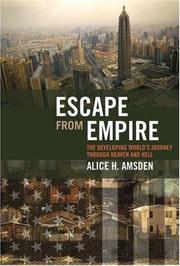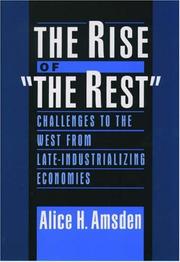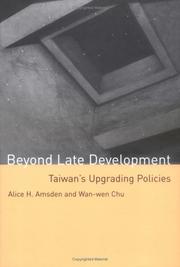| Listing 1 - 10 of 12 | << page >> |
Sort by
|

ISBN: 9780262513159 9780262012348 9780262267113 0262012340 0262513153 9786612098994 026226711X 1282098993 1429477075 9781429477079 9781282098992 0262261499 Year: 2007 Publisher: Cambridge MIT
Abstract | Keywords | Export | Availability | Bookmark
 Loading...
Loading...Choose an application
- Reference Manager
- EndNote
- RefWorks (Direct export to RefWorks)
In Escape from Empire, Alice Amsden argues that the more freedom a developing country has to determine its own policies, the faster its economy will grow. America's recent inflexibility - as it has single-mindedly imposed the same rules, laws, and institutions on all developing economies under its influence - has been the backdrop to the rise of two new giants, China and India, who have built economic power in their own way.
Economic policy and planning (general) --- Developing countries: economic development problems --- Developing countries --- United States --- Foreign economic relations --- Economic conditions. --- Economic conditions --- 327.1 --- 338.340 --- LDC / Developping Countries - Pays En Développement --- US / United States of America - USA - Verenigde Staten - Etats Unis --- Buitenlandse politiek. Economische sancties --- Algemene ontwikkeling in de Derde Wereld --- Developing countries - Foreign economic relations - United States --- United States - Foreign economic relations - Developing countries --- Developing countries - Economic conditions --- ECONOMICS/Political Economy --- ECONOMICS/Trade & Development
Book
Year: 1980 Publisher: New York Penguin
Abstract | Keywords | Export | Availability | Bookmark
 Loading...
Loading...Choose an application
- Reference Manager
- EndNote
- RefWorks (Direct export to RefWorks)
Sociology of minorities --- Sociology of the family. Sociology of sexuality --- Sociology of work --- Income --- Family --- Labour --- Sexual division of labour --- Telework --- Book --- Discrimination
Book
ISBN: 0312236719 Year: 1980 Publisher: New York (N.Y.): St. Martin's
Abstract | Keywords | Export | Availability | Bookmark
 Loading...
Loading...Choose an application
- Reference Manager
- EndNote
- RefWorks (Direct export to RefWorks)
Women --- Employment
Book
ISBN: 0199743606 Year: 1989 Publisher: New York ; Oxford : Oxford University Press,
Abstract | Keywords | Export | Availability | Bookmark
 Loading...
Loading...Choose an application
- Reference Manager
- EndNote
- RefWorks (Direct export to RefWorks)
This study demonstrates why South Korea has become the most successful in a series of developing countries that have succeeded through borrowing foreign technology rather than by generating new products or processes.
Industries --- Industrial policy --- Korea (South) --- Korea (South) --- Economic conditions --- Economic policy

ISBN: 0199881529 0195170598 1602569622 1423745663 1280481285 9786610481286 019803198X Year: 2001 Publisher: Oxford ; Hong Kong : Oxford University Press,
Abstract | Keywords | Export | Availability | Bookmark
 Loading...
Loading...Choose an application
- Reference Manager
- EndNote
- RefWorks (Direct export to RefWorks)
Alice H. Amsden describes how some developing countries outside the North Atlantic area were able to achieve accelerated economic growth following World War Two.
Competition, International. --- Industrialization --- Industrialització --- Competència econòmica --- Economia internacional --- History. --- Països en vies de desenvolupament
Book
ISBN: 067454983X Year: 1994 Publisher: Cambridge (Mass.): Harvard university press
Abstract | Keywords | Export | Availability | Bookmark
 Loading...
Loading...Choose an application
- Reference Manager
- EndNote
- RefWorks (Direct export to RefWorks)
330.342.14 <4-11> --- 338 <4-11> --- Mixed economy --- -Post-communism --- -338.24 (4-11) --- Postcommunism --- World politics --- Communism --- Economy, Mixed --- Third way (Economics) --- Capitalism --- Socialism --- Kapitalistische economie. Free enterprise. Markteconomie. Vrije concurrentie--Oost-Europa --- Economische situatie. Economische structuur van bepaalde landen en gebieden. Economische geografie. Economische produktie.economische produkten. Economische diensten--Oost-Europa --- Europe, Eastern --- Instrumenten van de economische politiek. Economische orde. Economisch politieke maatregelen. Stabilisering. Stimuleringsmaatregelen. Regulering. Financiele steunmaatregelen--Oost-Europa --- -Europe, Eastern --- -East Europe --- Eastern Europe --- Economic policy --- -Economic conditions --- -Mixed economy --- Post-communism --- Economic aspects --- -Economic policy --- 338.24 (4-11) Instrumenten van de economische politiek. Economische orde. Economisch politieke maatregelen. Stabilisering. Stimuleringsmaatregelen. Regulering. Financiele steunmaatregelen--Oost-Europa --- 338 <4-11> Economische situatie. Economische structuur van bepaalde landen en gebieden. Economische geografie. Economische produktie.economische produkten. Economische diensten--Oost-Europa --- 330.342.14 <4-11> Kapitalistische economie. Free enterprise. Markteconomie. Vrije concurrentie--Oost-Europa --- -330.342.14 <4-11> --- 338.24 (4-11) --- Economic conditions --- Europe [Eastern ] --- 1989 --- -Europe, Eastern - Economic policy - 1989 --- -Europe, Eastern - Economic conditions - 1989 --- -Europe [Eastern ] --- Europe, Eastern - Economic policy - 1989

ISBN: 0262011980 9780262011983 Year: 2003 Publisher: Cambridge (Mass.): MIT press
Abstract | Keywords | Export | Availability | Bookmark
 Loading...
Loading...Choose an application
- Reference Manager
- EndNote
- RefWorks (Direct export to RefWorks)
"In this book Alice Amsden and Wan-wen Chu cover new ground by analyzing the phenomenon of high-end catch-up. They study how leading firms from the most advanced latecomer countries like Taiwan have increased their market share in mature high-tech industries and services." "The profits that true innovators in these industries once enjoyed have already declined, but profit rates are still above average. The latecomer firm that succeeds in capturing these rents earns "second mover" advantage. Amsden and Chu examine the successful second movers in electronic and modern services. The critical factors, they show, are the government policies and large-scale firms that drive skills, speed, and scale."--Jacket.
338.22 --- Competition, International --- Industries --- -International competition --- World economics --- International relations --- International trade --- War --- 338.22 Economische organisatieleer. Economisch beleid. Economische politiek --- Economische organisatieleer. Economisch beleid. Economische politiek --- Industrial production --- Industry --- Economics --- Economic aspects --- International competition --- Industries - Taiwan

ISBN: 0262267101 0585482675 0262261383 9780262267106 9780585482675 9780585486215 0585486212 9786610753161 0191540064 1280753161 0191572470 9780191540066 9781280753169 6610753164 9780191572470 9780262261388 0262011980 9780262011983 Year: 2003 Publisher: Cambridge, Mass. MIT Press
Abstract | Keywords | Export | Availability | Bookmark
 Loading...
Loading...Choose an application
- Reference Manager
- EndNote
- RefWorks (Direct export to RefWorks)
What is Literary Theory? Is there a relationship between literature and culture? In fact, what is Literature, and does it matter? These are the sorts of questions addressed by Jonathan Culler in a book which steers a clear path through a subject which is often perceived to be impenetrable. It offers insights into theories about the nature of language and meaning, whether literature is a form of self-expression or a method of appeal to an audience, and outlines the ideas behind a number of different schools: deconstruction, semiotics, postcolonial theory, and structuralism amongst them.
Competition, International. --- Industries --- Business & Economics --- Economic History --- International competition --- World economics --- International relations --- International trade --- War --- Economic aspects --- Criticism. --- Criticism --- Literature - General --- Languages & Literatures --- Evaluation of literature --- Literary criticism --- Literature --- Rhetoric --- Aesthetics --- Technique --- Evaluation
Book
ISBN: 9780198716433 Year: 2014 Publisher: Oxford : Oxford University Press,
Abstract | Keywords | Export | Availability | Bookmark
 Loading...
Loading...Choose an application
- Reference Manager
- EndNote
- RefWorks (Direct export to RefWorks)
Development economics. --- Elite (Social sciences) --- Economie du développement --- Elite (Sciences sociales)
Book
ISBN: 0198716435 1283643901 0191634077 9780191634079 Year: 2012 Publisher: Oxford : Oxford University Press,
Abstract | Keywords | Export | Availability | Bookmark
 Loading...
Loading...Choose an application
- Reference Manager
- EndNote
- RefWorks (Direct export to RefWorks)
Elites play a crucial role in the development process. The impact they have on growth and development exceeds their representation within a country. This volume uses case studies from South Africa to China to seek an understanding of the relationship between elites and economic development.
Elite (Social sciences) --- Endowments. --- Power (Social sciences) --- Attitudes. --- Empowerment (Social sciences) --- Political power --- Exchange theory (Sociology) --- Political science --- Social sciences --- Sociology --- Consensus (Social sciences) --- Charitable foundations --- Charitable trusts --- Donations --- Educational endowments --- Endowed charities --- Foundations (Endowments) --- Philanthropy --- Private foundations --- School endowments --- Education and state --- Charities --- Development economics --- Elites (Social sciences) --- Leadership --- Social classes --- Social groups --- Economics --- Economic development --- Social aspects --- Economic conditions --- E-books
| Listing 1 - 10 of 12 | << page >> |
Sort by
|

 Search
Search Feedback
Feedback About UniCat
About UniCat  Help
Help News
News